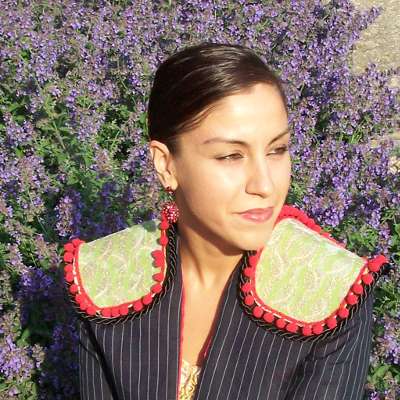Sadler's Wells is currently presenting the Sadler's Sampled Festival (which is taking place June 17-29). Having visited the theatre numerous times in the past, this is a new way of seeing the space: half the seats have been pulled out, the mix of people both young and old are both standing and seated, a few are in eccentric attire and others are more formally dressed. The hip atmosphere set the tone for Dada Masilo's Swan Lake.
We began the evening with an excerpt from the finale of the classic Swan Lake's acte blanc (literally white act). Out came 15 dancers, a mix of men and women in white tutus, moving in unison with superb precision, arms flapping and fingers waving. A reverence followed, which expressed love and had the illusion of an unrealistic fantasy dream world. After the dramatic walks and mesmerizing reverence, Nicola Haskins, the MC who also played the role of school headteacher, ran out waving a rigid plastic hand pointer and summarized Swan Lake's basic premise – the tragic love story of good and evil with two central characters, Odette (Dada Masilo) and Siegfreid (Songezo Mcilizeli). Haskins went through the storyline explaining that the “the dreamy, gloomy couple knew they would never get married” and that the men's “virility splits” were part of the courting scenes in the original ballet. Haskins ended her clever lecture with the “nobody loves me fold”, the classical dying swan position, but Masilo's version was incredibly comical and admirably performed.
Masilo's version of Swan Lake combined modern gestures and Beyonce-esque booty twerks with classical ballet phrases. The piece was a mixture of parallel foot positions with African dance movements interrupted by technical ballet phrases. Her conceptual patterns reminded me of a chess game, while her choreographic voice seemed clear and well thought-out but lacked maturity. The Lake trio and The Wedding piece were great examples of combining the classical ballet phrases, typically done in hyper-speed, with the African dance moves from Masilo's home country South Africa. However, it always felt like the dance oscillated between the worlds of classical ballet and African dance without seeking a middle ground. The third act got closer to finding that missing balance – there were some exquisite moments – but still left me wanting more.
Swan Lake's music, traditionally purely Tchaikovsky, was rearranged to fit Masilo's modern vision and included music from Rene Avenant, Camile Saint-Saens, Arvo Part and Steve Reich. Masilo broke the audience-performer barrier that usually exists in a formal setting and honored a call and response tradition, typically found in African drumming. Off-stage dancers were engaged and became part of the onstage score, through their yelling and encouragement. There were signature moments that were incredibly golden. Masilo creates an ecology of new work which explores fast leg kicks, strong lifts and traditional Swan Lake solos performed in fast-forward. Another highlight of the evening was a Dying Swan solo which was an emotional and technical highlight of the show performed by a male dancer on pointe.
Where are all of the female dancers and choreographers, you ask? This is a theme that seems to permeate the dance scene at the moment. Sadler's Wells found one and showcased Dada Masilo's modern day version of the timeless classic Swan Lake. The South African born dancer moved to Brussels for her studies and was obviously influenced by the journey. Masilo's Swan Lake with its 15 dancers was performed in Sadler's Wells, on a stage that has seen many previous Swan Lakes. Sadler's Wells was the first theatre to host Matthew Bourne's all male version. Masilo presents another witty and creative Swan Lake with male bodies on stage in white tutus with fluttering arms.


